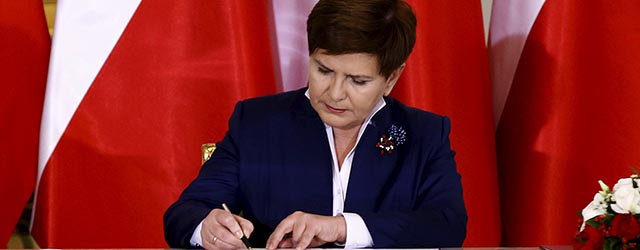The appointment of Beata Szydo as Poland’s new prime minister, following the victory of her conservative Law and Justice party (PiS) in the latest parliamentary election, has stirred concerns about her relative inexperience and a potentially populist, rightward lurch for the nation.

“She is a relatively young politician who has emerged as a good campaign organizer and charismatic personality,” says Tsveta Petrova, senior analyst for Central and Eastern Europe at the Eurasia Group. But “some people think that she might get overwhelmed” in the role of prime minister.” Her inexperience may give PiS leader Jarosaw Kaczyski an oversize role behind the scenes.
On the plus side, says Felix Winnekens, S&P Europe’s associate director for sovereign ratings and international public finance, PiS “will be able to govern alone without having to rely on smaller, sometimes extremist, parties. That will help the predictability of this government.”
“We do not see political instability in the near term,” he said.
But economic change is likely. Winnekens anticipates an expanded role for the public sector, with larger government expenditures. To compensate, the government is eyeing the banking sector, which will likely be hit with a new bank tax and a proposed conversion of Swiss-franc-denominated mortgages into Polish zlotys—with the goal of lowering household debt. Retailers will probably take a tax hit too. New central bank appointments might lead to more dovish monetary policy.
While all this could weaken the country’s public finances after years of fiscal consolidation, it’s still unclear how a nationalist agenda will affect foreign companies and investment since there is also a clear focus on supporting Polish business.
Some wonder if Poland’s place in Europe might undergo a subtle shift. “The new government will be more euroskeptic than the previous one but not anti-European,” says Agnieszka ada, head of the European program at the Institute of Public Affairs in Warsaw. “They will be more pragmatic than their campaign rhetoric suggested.” But she’s convinced Warsaw will seek a bigger role vis-à-vis the Ukraine crisis and US involvement in European defense. It will also likely push back against some European environmental regulations. “It’s a mixed bag,” concludes Petrova.



